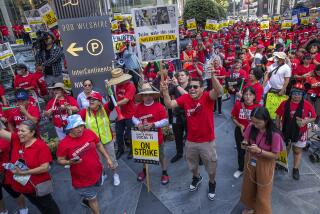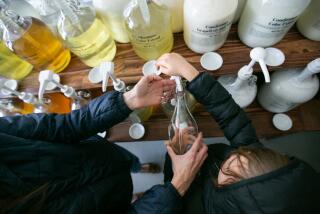Wanted: hotels’ used soap. Reward: fighting coronavirus. The problem: no guests
Many low-income people can’t get their hands on soap in the best of times. In the time of coronavirus, it’s even farther out of reach.
To meet the need, Clean the World, founded in 2009, has relied on hotels around the world to donate used bars of soap that are then recycled and distributed from facilities in Las Vegas and Orlando, Fla., both top tourist destinations with thousands of hotel rooms.
But now the nonprofit is in a quandary: Most of its 8,000 donor hotels are closed, yet the need for soap is increasing, not only in the 127 foreign countries it serves but in the United States.
“Our hotel donations have gone down dramatically,” said Shawn Seipler, the charity’s founder.
Seipler said soap manufacturers and companies that provide bath amenities to hotels have picked up some of the donation slack during the hotel shutdown, but the slim supply is another unintended consequence of coronavirus.
Health experts urge frequent hand-washing to stem the spread of coronavirus, but now Americans, including many of the 20.5 million newly unemployed, are discovering that benefits of the Supplemental Nutrition Assistance Program (formerly food stamps) cannot be used to buy non-food products, including soap.
“In those at-risk families — lower income and underserved — we’re seeing a huge demand for our soap,” Seipler said. “That’s who we’re targeting at this time.”
But is it safe? Even if the novel coronavirus existed on bars of donated soap, Seipler said the recycling process, which includes super-heating crushed soap and treating it with a bleach solution, would kill it.
In the last 60 days, Clean the World has delivered 3 million bars of soap and expects to ship 4 million more in the next two to three months, he said.
Unlike the pre-pandemic days, when most of the soap went overseas, much of it is now staying in the U.S. As increasing numbers of people reach out for a helping hand, the nonprofit is working hard to keep up.
“The demand that we’re seeing right now from food pantries and local relief organizations is through the roof,” Seipler said. Each 3-ounce bar is good for about 100 hand washings.
The Vegas recycling plant is open during the pandemic, but it is not getting any bars of used soap from big resorts, including The Venetian, which has been a backer since the nonprofit’s earliest days.
“Our company is proud to have helped recycle 2.3 million bars of soap through our relationship with Clean the World,” said Ron Reese, a senior vice president of Las Vegas Sands, the parent corporation of Venetian and Palazzo.
The company donates soap not only from its Las Vegas resorts but from those in Macau and Singapore. Used soap from the Asian gambling meccas is recycled at a facility in Hong Kong.
In the charity’s early years, Las Vegas Sands also provided a much-needed infusion of cash to the nonprofit’s plant just two miles from the Strip.
“[We] contributed $1 million to Clean the World, which at the time was their largest corporation donation,” Reese said. “Through that donation, we were able to provide much-needed equipment here in Las Vegas so they could meet the demands they were starting to see.”
Although the charity also accepts and recycles hotel amenities such as individual-use bottles of shampoo and conditioner, the current emphasis is on what is most needed: bars of soap.
When he founded Clean the World in 2009, Seipler was spending four nights a week in hotels. He was part of the problem, not the solution.
“We were throwing away a million bars of soap a day at hotels across the U.S.,” he said.
“In 2009, there were 9,000 children under the age of 5 dying every day from hygiene-related illnesses,” he added. Pneumonia and diarrheal disease were the main causes.
Seipler also expects donations of the small plastic bottles of body soap, shampoo and conditioner to decline once California outlaws them to reduce plastic waste. The law banning California hotels from using little plastic bottles for its amenities goes into effect in 2023.
“The ‘why’ of that we’re behind tremendously,” he said.
Seipler said people seeking further information should email [email protected].
More to Read
Sign up for The Wild
We’ll help you find the best places to hike, bike and run, as well as the perfect silent spots for meditation and yoga.
You may occasionally receive promotional content from the Los Angeles Times.






